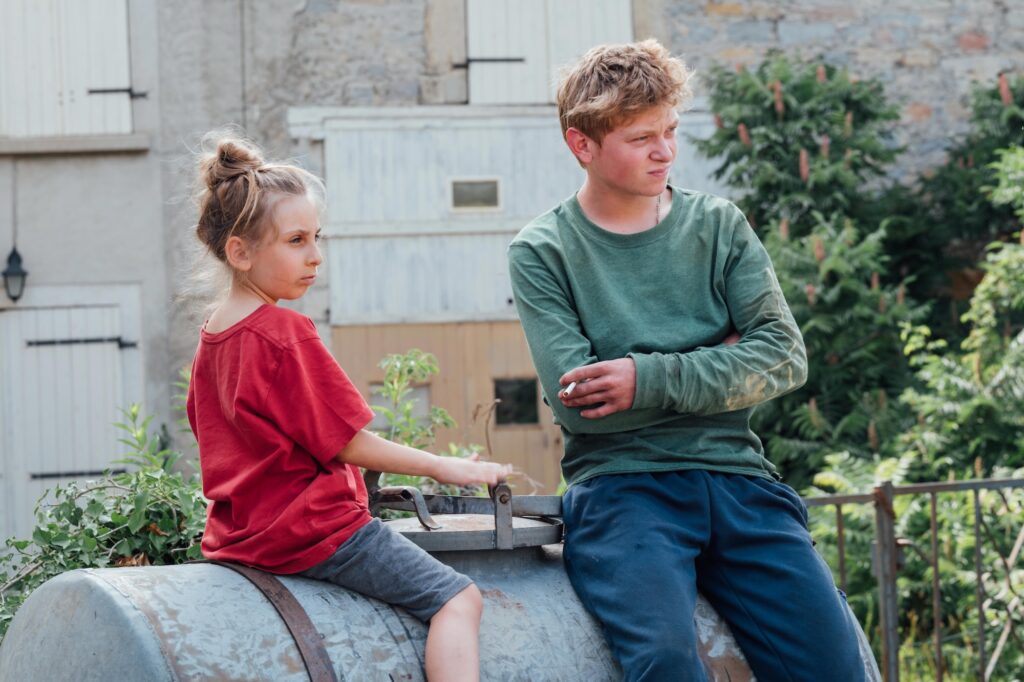In Louise Courvoisier’s Debut Feature, ‘Holy Cow,’ the Director Gets Great Performances From the Actors, All First-Timers
Is there a happy ending? You bet there is, except it’s not altogether what you might expect, being surprisingly raucous and laugh-out-loud funny.

How familiar moviegoers might be with “Les Pieds Nickelés” or comté cheese will depend on their level of Francophilia. The latter is likely better known to Americans than the former, a comic strip started in 1908 by Louis Forton revolving around a trio of ne’er do well brothers. Dairy products and slackerdom also figure significantly in Louise Courvoisier’s debut feature, “Holy Cow.”
The French title for Ms. Coirvoisier’s picture is “Vingt Dieux,” a turn of phrase translated as “twenty gods,” a less blasphemous version of sacré Dieu that connotes incredulousness or surprise. The English title is more of a pun, given the centrality of cows to its story of inadvertent adulthood in-and-around the provinces of France. Welcome to Jura, a rural outpost that abuts the western border of Switzerland.
It is here that we meet Totone (Clément Faveau), a hard-partying 18-year-old who doesn’t think twice about stripping down to his birthday suit if there’s a drink in it for him. He lives in a weatherbeaten home with a single father and 7-year-old sister, Claire (Luna Garret). His buddies, Frances (Dimitri Baudry) and Jean-Yves (Mathis Bernard), are similarly tempestuous and pleasure seeking.
Our hero is a chip off the old block: Totone’s father is no stranger to drink. When Totone attends a concert at the local bar, he’s chagrined to see dad take to the stage in a state of extreme drunkenness, ultimately tumbling into a stupor. Totone escorts him outside and chides dad into driving home. We don’t need to overexert our imaginations to intuit what follows: Dad runs the car into a tree and dies. Totone is left rudderless and Claire without an adult in the house. Things don’t augur well.

Totone is subsequently hired to work on the farm of a neighbor, a gesture made less out of necessity than pity. Totone is schooled in the arduous art of making cheese — scrubbing large metal cauldrons is part of the job — but has to deal with his co-workers: local toughs with whom there’s been some late-night fisticuffs. When Totone takes a potshot at one of them on the jobsite, the boss fires him, but not before Totone learns of a comté competition that promises a cash prize of 30,000 euros.
A cheese-making bee is subsequently installed in Totone’s bonnet, but there’s a problem: How to get the milk? Enlisting Frances and Jean-Yves as accomplices, Totone hatches a plan to steal the necessary ingredient from the farm of his former employer. In doing so, he becomes acquainted with the boss’s daughter, Marie-Lise (Maïwène Barthelemy). Through some mutual feinting and flirting, the two begin rolling in the hay. Handy, that: While Marie-Lise and Totone regularly enjoy each other’s company, Frances and Jean-Yves take to pilfering milk with a lesser risk of detection.
A win-win situation, no? For the nonce, yes, but Totone’s machinations are ultimately upended, the attempts to make cheese are halting, and his friendships are rent asunder. The wonder of Ms. Courvoisier’s screenplay, which she co-wrote with Théo Abadie, is how it doesn’t sell short Totone’s humanity at the expense of his immaturity or pigheadedness. Lessons are learned: A coming-of-age picture would be nothing without them. But “Holy Cow” puts them into place with a welcome generosity of spirit.
Boys will be boys, but there’s no fashionable misandry afoot here. Sure, Totone and company are testosterone-infused lunkheads, but they also have hearts and prove capable of growth. Credit Ms. Courvoisier’s knack for working with actors — all of whom, amazingly enough, are first-timers. The rosy-cheeked Mr. Faveau navigates belligerence, desperation, and loyalty with equal aplomb. Ms. Garrett and Ms. Barthelemy cut sympathetic figures even as they don’t lose sight of their characters’ limitations.
Is there a happy ending? You bet there is, except it’s not altogether what you might expect, being surprisingly raucous and laugh-out-loud funny. In a culture as fractured and cynical as our own, a lovely meditation on experience like “Holy Cow” comes not too soon. Ms. Courvoisier has made a fulsome and heartening movie.

